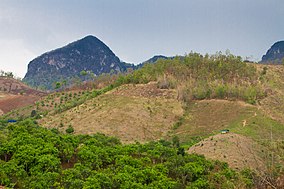Si Lanna National Park
| Si Lanna National Park | |
|---|---|
| อุทยานแห่งชาติศรีลานนา | |
 | |
| Location | Chiang Mai Province, Thailand |
| Nearest city | Chiang Mai |
| Coordinates | 19°16′56″N 99°5′28″E / 19.28222°N 99.09111°E |
| Area | 1,405 km2 (542 sq mi) |
| Established | August 1989 |
| Visitors | 81,664 (in 2019) |
| Governing body | Department of National Parks, Wildlife and Plant Conservation |
Si Lanna National Park (Thai: อุทยานแห่งชาติศรีลานนา) is a national park in Chiang Mai Province, Thailand. Home to waterfalls, caves and springs, this mountainous park is the source of numerous tributaries of the Ping River.[1]
Geography
[edit]Si Lanna National Park is located about 65 kilometres (40 mi) north of Chiang Mai in Mae Taeng, Chiang Dao and Phrao districts. The park's area is 878,557 rai ~ 1,405 square kilometres (542 sq mi).[2] The highest point is Doi Chom Hot peak at 1,718 metres (5,636 ft). The 16 km2 (6.2 sq mi) Mae Ngat Somboon Chon Reservoir lies within the park.[3][4]: 101
History
[edit]On 1 August 1989, Si Lanna was designated Thailand's 60th National Park.[1] This national park is home to hill tribes including Karen and Lahu.[4]: 102
Attractions
[edit]Mon Hin Lai Waterfall is a nine-tiered waterfall located in the Mae Ngat Forest. Other waterfalls include Huai Mae Rangong and Huai Pa Phlu.[5] The Nong Pha cave system features stalactites and stalagmites.[3]
Flora and fauna
[edit]The park's rugged terrain features numerous forest types: mixed deciduous, moist evergreen, hill evergreen and dipterocarp. Tree species include Tectona grandis, Pterocarpus macrocarpus, Dalbergia oliveri, Hopea odorata, Shorea obtusa, Dipterocarpus obtusifolius, Dipterocarpus tuberculatus, Irvingia malayana, Xylia xylocarpa, Cinnamomum iners, Toona ciliata, Lagerstroemia calyculata and Shorea siamensis.[3]
Animal species include tiger, Asian black bear, sambar deer, northern red muntjac, macaque, Siamese hare and wild boar.[3] Bird life includes coucal, bulbul, barbet,[3] little egret and lesser whistling-duck.[4]: 102–103
Location
[edit]| Si Lanna National Park in overview PARO 16 (Chiang Mai) | ||||||||||||||||||||||||||||||||||||||||||||||||||||||||||

|
See also
[edit]References
[edit]- ^ a b "Si Lanna National Park". Department of National Parks (Thailand). Archived from the original on 23 May 2013. Retrieved 4 July 2013.
- ^ "ข้อมูลพื้นที่อุทยานแห่งชาติ ที่ประกาศในราชกิจจานุบกษา 133 แห่ง" [National Park Area Information published in the 133 Government Gazettes]. Department of National Parks, Wildlife and Plant Conservation (in Thai). December 2020. Retrieved 1 November 2022, no 60
{{cite web}}: CS1 maint: postscript (link) - ^ a b c d e "Si Lanna National Park". National Parks in Thailand (PDF). Department of National Parks (Thailand). 2015. pp. 94–95. ISBN 978-6-1631-6240-3. Archived from the original (PDF) on 15 February 2017.
- ^ a b c Elliot, Stephan; Cubitt, Gerald (2001). THE NATIONAL PARKS and other Wild Places of Thailand. New Holland Publishers (UK) Ltd. ISBN 9781859748862.
- ^ "Sri Lanna National Park". Tourism Authority of Thailand. Retrieved 21 June 2017.

